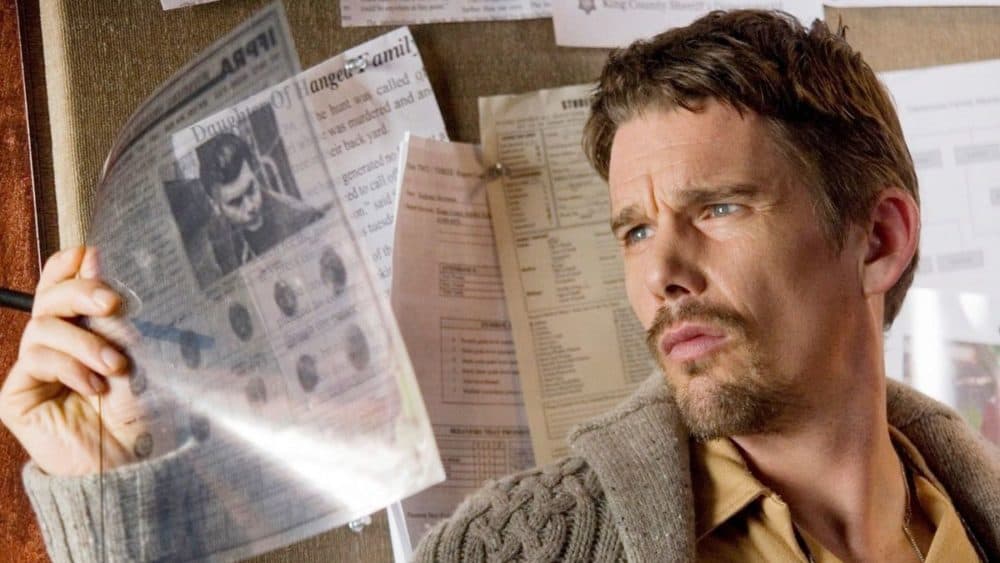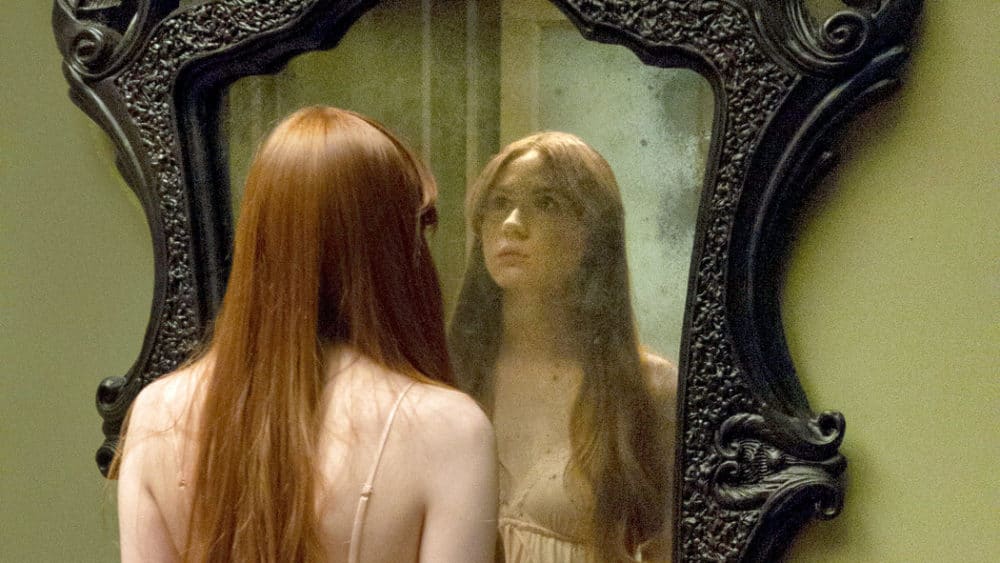
When the history of early 21st century horror is written, Jason Blum’s namesake production company will be heralded as one of its founding fathers. Alongside the New French Extremity and the recent trend in English-language arthouse screamers, Blumhouse Productions has been at the forefront of what terrifies us in the new millennium.
From the abstract to the concrete — ghosts, half-forgotten gods, disease and society as a whole — Jason Blum’s production company has offered an almost unerring portrait of the horrors of world we live in. And over the last decade, from their popular beginnings with Paranormal Activity (2009) to their most recent tour of duty with The First Purge (2018), they have delivered some of the most seminal cinema of the Bush, Obama and Trump years. And looking back on it all, it really is astounding how spectacular their run has become.

Sinister (2012)
Although invariably better than average at the time, the early years of Blumhouse were something of a mixed bag in terms of quality. The Paranormal Activity movies didn’t get good until the third outing (and the first, quite frankly, is damned near unwatchable). The Insidious franchise wasn’t worth the price of admission until the wibbly-wobbly plotline of the second installment retroactively made the first movie really interesting. The rest of their nascent catalog were mostly comprised of underwhelming family comedies starring The Rock and honest-to-God Lifetime Channel romantic mainstays. Sinister, an unassuming murder-mystery starring the resplendent Ethan Hawke, was their first genuinely great film.
It’s retroactively obvious (at least, more than it was initially) that much of the film’s success rests squarely on the shoulders of writer-director Scott Derrickson. Between his street-wise script (co-written by fellow Doctor Strange (2016) scribe C. Robert Cargill) and playfully teasing direction — ably assisted by an overall strong cast and atmospheric set design — he was able to create a nightmarish middle-ground between uncertain dreaming and stark reality where his ghoulish figures could exist with unsettling ease. If not the company’s best film (although it is certainly in the running for that), it is undoubtedly its most frightening.

Oculus (2014)
With all due respect to Mr. Derrickson, who is fast-becoming one of my favorite new directors to hit the big leagues in some time, his entry on this list, though chilling to the bone, is ultimately not the best-directed feature to come out of the house the Jason Blum built. Although built on high-strung suspense, atmospheric dread and smartly punctuating scares, the picture in question is ultimately a straight-forward narrative played with the same methodical earnestness with which its protagonist goes about researching his next true crime book. Its skill is demonstrated by being the best possible version of a fairly basic concept. Oculus writer-director-editor Mike Flanagan was served up a far taller order when he signed on for this mesmeric project.
While it might at first seem to be about the second-cousin to 1408 (2007)‘s “evil f*cking room,” Flanagan’s cerebral use of match-cuts, parallel editing and interwoven narrative (which occurring across several different periods of time) elevate its potentially simplistic subject matter into something resembling “high” art: closer to Hereditary (2018) than it is to some run-of-the-mill, pedestrian haunting. Watching Oculus is a hypnotic experience that is seemingly impossible to not lose yourself in (disturbingly, in much the same way that its characters lose themselves in the reflected histories of the titular mirror itself), adding meta-textual layers to its narrative with terrifying implications for the viewer.

Whiplash (2014)
Although Blumhouse found its niche in low-budget, high-concept horror movies, that was never their exclusive purview. They have also dabbled in comedies and thrillers and, yes, dramas too. And with their eye for stand-out scripts and the talented filmmakers best-equipped to bring them to life on the screen, this likely isn’t the last such non-genre film the studio is likely to release.
Basically the only real challenger to Sinister‘s throne on top of the company, this character study depicts the dysfunctional partnership of unparalleled jazz musicians: an talented percussive prodigy and the abusive director between whose clashing personalities one-of-a-kind music is made. And despite the trademark presence of jazz explosively plastered across the film like the acoustic equivalent of a Jackson Pollock painting, everything about it is so horrifically, viscerally rendered that it’s next to impossible to believe that the it came from the same writer-director responsible for the bubble-gum colored La La Land (2016).

Get Out (2017)
Given the direction that the company is headed creatively and the increasing momentum that the Academy is picking up as it brings its membership into the 21st century, it’s only a brief matter of time before one of Blumhouse’s films wins an Oscar for Best Picture. Whiplash was a dark horse contender for the award in its day and Get Out came in second in a two-horse race against Guillermo del Toro’s The Shape of Water (2016). If not now, then soon, as the demand for and respect given to horror and black-hearted dramas is inching ever closer to mainstream respectability.
Ostensibly a color-swapped reimagining of The Stepford Wives (1975), it takes its skin-deep premise and manages to dredge up the racial anxieties that bubbled just beneath the surface of American society for decades. Delving deeply into issues of miscegenation, racialized power dynamics and cultural appropriation, Get Out is perhaps the most conceptually ambitious and smartly scripted horror film of the last two decades, and certainly the most explosive directorial debut since Steven Spielberg’s Duel (1971) or even Orson Welles’ classic Citizen Kane (1941).

Split (2017)
Although it’s hard to imagine now (especially to younger cineastes who weren’t in the thick of things at the dawn of the 21st century), but oft-maligned writer-director M. Night Shyamalan is actually one of the sharpest, most talented filmmakers working today. The problem is that he hasn’t had anything close to resembling a good movie since at least Signs (2002), over a decade and a half ago. The Sixth Sense (1999) is an immaculately composed, horrifically shot, dramatically satisfying masterpiece that still holds up today. Unbreakable (2000) is THE most underrated superhero movie of the current cycle. And Signs (2002) was a smartly-written film less about invading aliens as it was about what such an event would do to ordinary, God-fearing people.
But after The Village (2004) and Lady in the Water (2006) and The Happening (2008) and The Last Airbender (2010) and After Earth (2013) and The Village (2015) — man, there really were a lot of terrible movies all in a row — it’s understandable that movie-goers would lose faith in the one-time wonderboy of American cinema. But with this unassuming secret-sequel to the exceptional Unbreakable, Shyamalan exploded back into the hearts and minds of even his most jaded former fans. Not only does the film offer a genuinely inventive take on the Silence of the Lambs-esque procedural thriller, but it features one of the most remarkable stretches of acting in the annals of the medium: James MacAvoy switching seamlessly between 24 distinct personalities, each with their own unique mannerisms, speech patterns, gaits, temperaments and bodies of knowledge to draw from (not to mention complex inter-personal politics that sees them as much at odds with one another as they are with their kidnapped victims). It is an phenomenal thing to see unfold on the big screen, and required reading for any aspiring thespian.
 Follow Us
Follow Us





